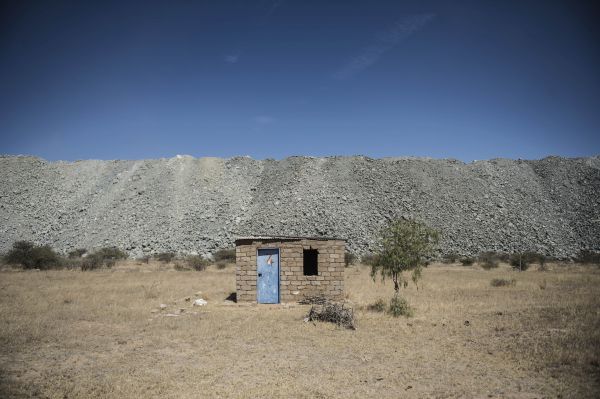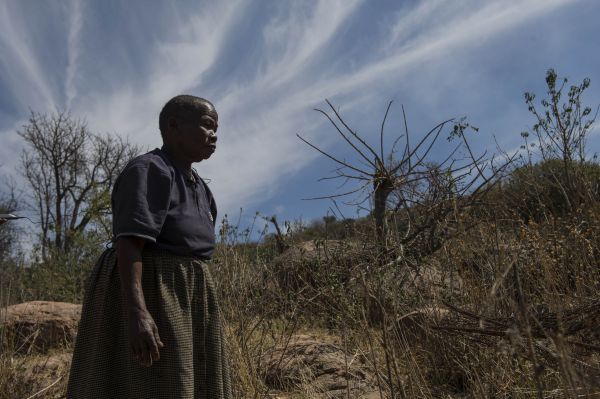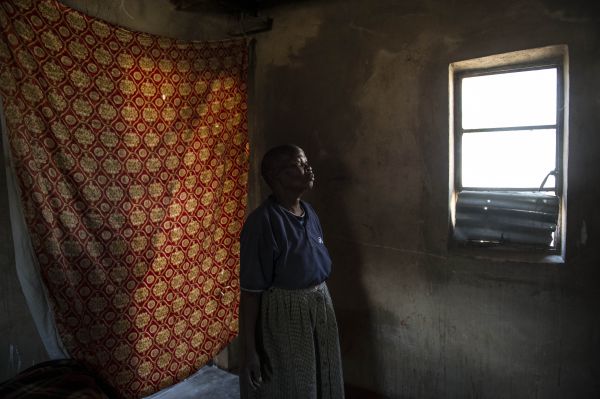Villages in Limpopo’s platinum-rich belt have been destroyed. Madimetja Albert Ramatsobane lives alone.
He has not seen or spoken to any other person in almost four weeks. He lives alone in a small brick house in what used to be a village of more than 400 households. He is a prisoner of his conscience and his love of the land.
His home is on an elevated rocky outcrop, dwarfed by boulders and towering mine dumps. A rusted cart is parked in front of his home, from where in the distant northwest, across stretches of dry sicklebush and grass one can see the remains of a rural village laid out between wide, sandy streets.
A few hundred metres to the southwest of his home, gigantic mining trucks traverse grey dumps looming over the landscape. Clouds of dust rise up to the desolate sky as the roaring trucks stop to dump tonnes of rocks on to the grey hills.
The roar of the truck engines and falling rocks disturb the soothing natural orchestra arising from the hills and veld.
In another time, it was probably a picturesque village. Although some of the natural beauty, including a giant boulder reputed to be inhabited by a giant serpent, remains, this land is now a deserted, godforsaken place.
Once this was Ga-Sekhaolelo, a village with shops, football fields, schools and churches. But now only one man lives here. And he plans to remain here until he joins his ancestors in their eternal sleep.
Thirteen years ago, bulldozers flattened all but one of the houses to make way for the expansion of the world’s biggest open-cast platinum mine in the world, Mogalakwena.
This was after residents, following protracted negotiations and battles involving lawyers, finally accepted a settlement from Anglo American Platinum to relocate to a place called Armoede (which means destitution), a township-style development some 12km away.
But one man refused to accept the offer of a house and cash payment of about R20 000. He chose to live in solitude and poverty on the land of his birth, the land where his forebears lie buried.

His name is Madimetja Albert Ramatsobane, a vocal, deeply angry and defiant man who vows never to betray the wishes of his ancestors.
On the other side of the hills, about 3km to the south of Ramatsobane’s house, is Motlhotlo. In another time, it was a settlement of more than 500 families. But it now resembles a deserted village of ghosts.
About 50 families, diehards who have refused to be separated from the land of their birth and their old way of life, remain. Between the few occupied houses that remain, the ruins of scores of demolished buildings dot the landscape, evidence of the removal of more than 450 families that once called this place home.
The residents have been moved to Rooibokfontein, another township-style development about 7km to the east, across the N11 that connects Mokopane to Botswana in the northwest.
Sara Tsebe, 91, is among the few remaining residents of Motlhotlo. Like Ramatsobane, she has refused to move for the sake of the mine.
The villages of Motlhotlo and Ga-Sekhaolelo, in the Mapela district of Mokopane, Limpopo, are located along a platinum-rich belt being mined by Anglo. In the past 15 years residents of these villages and Ga-Puka and Ga-Pila have fought against their relocation. But most of the residents have been relocated. Only a few households remain in Motlhotlo.
Tsebe was born in this village and recalls a time when young men hunted small game and the residents ploughed huge tracts of land. That was a time when villagers lived off the land and from remittances sent by migrant workers.
They ploughed the lands and harvested bags of millet and mealies, which they sent for milling and storage and kept some to grind for their daily sustenance. Tsebe remembers a time when they had water in abundance and the people had very little use or need for money. The land was their bank, their bakery, their supermarket and their butchery.
But time, master of all things under the sun, has brought with it radical change in these parts. The need for the minerals beneath the place of Tsebe’s birth is now at odds with the old way of life and residents’ hold on the land.
Anglo wants the platinum. In return, it promises jobs and development, promises that for many remain just pie in the sky.
To people like Tsebe and Ramatsobane, land is at the very core of their existence. It is their connection to the spirits of those who came before them, a gift from their ancestors, which they hold in trust on behalf of their children, their children’s children and way beyond.
Tsebe points to a shrine, a simple circle of stones around a marula tree, at the corner of her home. This is where she performs ceremonies to communicate with her forebears about her worldly issues, among them the grave problem of relocation. When news of the relocation seemed inevitable she got so angry she chopped off the branches of some of the marula trees she had planted in the yard.
The marula tree is regarded as an integral part of a home in some Bantu cultures, a link between the living, the dead and, greatest of all, the land. New leaves are now sprouting from the branches, perhaps a sign that the gods are not too angry with her.
“If it happens that we leave this place, we will have to announce to the gods that we are leaving. We will carry them with us and when we get to where we are going to settle we will also announce that this is where we have resettled,” she says.
The land is too precious to simply give up; it is intrinsically linked to their very existence.
Initially Anglo offered people R20 000 and a house in exchange for them to leave. But Tsebe says this is an insult.
“What is R20 000?” she asks.
She wants compensation that is more than enough to take care of her grandchildren, an amount that can be invested so that she and her grandchildren can live off the interest. After all, by agreeing to leave their land, they would be making an unimaginable sacrifice that may even anger the ancestors.
The ties to the land transcends generations. Mamma Matjiu, 39, is a fierce critic and active opponent of relocation. Her house is just 300m from the towering mine dumps. She was born in Motlhotlo.
Everything she knows she learnt from this village. On a swelteringly hot late morning, she takes a walk around the village, stopping to reminisce about stores and homes that exist no more.
The site of the school where she matriculated is now buried under the rubble dug up from the earth. She too does not want to leave Motlhotlo. But indications are that, eventually, the last remaining people will leave soon. There is not a single school or store left in Motlhotlo.

Sara Tsebe (above) refuses to move for Anglo.

Lawyers representing Motlhotlo’s residents have reached a deal with Anglo to purchase land for the last remaining residents about 80km away to the south in Mookgophong. There, unlike the majority of people who moved to Rooibokpan, they will be able to farm and live off the land. But still it would not be Motlhotlo, the home they love and feel connected to.
The lawyers have also convinced Anglo to provide the families with a regular supply of water, monthly food vouchers of R1 000 and daily free transport to the stores, school, work and clinics.
But Ramatsobane vows never to move and wishes to be buried in Ga-Sekhaolelo, where his father and grandfather lie buried. If he should move, he says he would settle for the ruins of his father’s old homestead not far from his house. He makes it very clear that he cannot live anywhere else but here.
He was so determined not to leave the village that, when the rest of the residents accepted the offer to move, he cut ties with them and cancelled the power of attorney he had vested with their lawyer, Richard Spoor, when they agreed to move.
“If I die I will at least get some rest from this thing,” says Ramatsobane, squinting his eyes in the harsh daylight.
He walks in painfully slow steps, holding on to the walls of his house for balance. His eyesight is poor. His only companion is a scrawny cat with faded fur that exposes a rough skin covered in sores. Its forehead has fresh bloody wounds. The cat circles around Ramatsobane feet, constantly rubbing its head against his boot, much to his irritation.
The cat mews constantly, seemingly in pain or itching from its scarred skin.
“This is a stupid cat. There are plenty of rats around here. But he finds it easier to irritate me by stealing my food,” he says.
Ramatsobane’s hair is woven into thin dreadlocks hidden under a hat. His jacket shines with a layer of dirt and he uses it constantly to wipe away the gunk on the edges of his eyes and lips.
“I will not leave this place. I will die here in my father and mother’s land,” he responds when asked whether he is content with the solitude of life here.
He has no cellphone or any other means of communication. The only time he gets to interact with other people is when a driver arrives to take him to collect his monthly state pension or when Anglo staff deliver water.
“This is the fourth week I have not seen any other person,” he answers to a question about the last time he spoke to anyone.
He is adamant that no amount of money or material things would get him to leave. His house has no electricity or running water. He stores the water delivered by Anglo trucks in a myriad containers in his kitchen. The kitchen, a one-room structure detached from the main house in which he allows no strangers, is a sorry mess.
The dry hides of a warthog and an aardvark hang on wires tied to the tin roof darkened by exposure to smoke from wooden fires. Before his eyes started troubling him, he hunted in the veld and in the hills. He lived off the land, harvesting wild fruit and herbs, planting his own crops in his yard and in the fields. But he can’t see further than a few metres now.
In his kitchen a stained black coal stove sits on the right side of the creaking wooden door. The floor is littered with firewood, dust, ash, used plates, pots, pieces of wire and other rubbish.
“I have remained here because of my father and my grandfather. They told me they had worked for this land and there is no way they can be separated from it,” Ramatsobane says.
He points to the north where he says the ruins of his grandfather’s homestead stand and where his own father was born.
“They were moved from there by the Boers many years ago. I was born here and I don’t want to promise anyone that I would ever leave. They [his father and grandfather] told me this is the land from which they survived and I must never leave.”
Ramatsobane says the issue of the land is causing him much agony. He believes that the spirits of his father and grandfather are restless because of the mining in the area and the threat that their homestead could be demolished.
He says he needs to perform a ritual to appease their spirits and to ask for strength. He needs to brew beer, sacrifice a bull or a goat and feed the people he would invite to the ceremony. But he has lost all his cattle. He is left with only three sheep and several donkeys, and they are in the care of Matjiu’s family in Motlhotlo.
Matjiu, who has been trying to find work for a long time without success, also believes her luck will turn if she makes a sacrifice to the ancestors. In 2014, she was shot in the face by mine security guards when the residents of Motlhotlo marched to the mine in a bid to discuss unfulfilled promises with its management. She still bears the scar on her upper lip. After she was shot she was arrested together with other residents.
While she was in police detention, her grandmother died from natural causes. Now she is troubled by visions and dreams in which her grandmother asks her to perform a ceremony. But, being unemployed and with children to raise, she cannot even begin to raise the money needed for this sacred ritual.
The land remains at the centre of the need for these spiritual sacrifices, as articulated in the novel Hold My Hand I’m Dying by John Gordon Davis.
The novel, set in the then Rhodesia in the 1960s, articulates the pain, anguish and anxiety of the people of the Zambezi Valley who faced the prospect of leaving their ancestral land to make way for the Kariba Dam.
Gordon writes about one frantic elderly man who, during this period of uncertainty, knelt at the graves of his ancestors and pledged his loyalty to them, saying: “I swear I will never leave you my ancestors … for that is a shameful and a foolish thing.”
It may be a shameful and foolish thing also for Tsebe, Ramatsobane and Matjiu to leave their ancestral lands. But just like the people of the Zambezi Valley those many years ago, it appears it will not be too long before they also lose the battle. — Mukurukuru Media